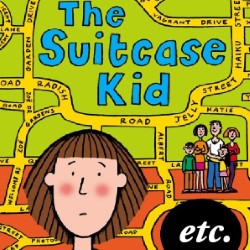A play written for children has two audiences to please – the kids themselves, and the adults who come with them. Emanuel Theatre Company’s The Suitcase Kid, playing at The Space on Niddry Street and based on the popular children’s novel by Jacqueline Wilson, must therefore work on multiple levels, whilst judiciously employing theatrical techniques to make the successful leap from page to stage.
On a purely practical level, the show is not perfect. The ending is a little rushed, the cast a little too large and the songs merely serviceable, but the rawness of the plot is well-served and ably-balanced by clever, well-paced direction and the effective use of space, sound, colour, lighting, puppets and props.
On the whole, The Suitcase Kid succeeds. We’re sucked immediately into the worldview of Andy, a likeable little girl whose parents have divorced, and who – with her suitcase and toy rabbit, her only constants in a world that seems anything but – is compelled to move “from A to B”, living one week with Mum and the next with Dad. Andy has two houses now, but feels she has no home.
It is not always comfortable viewing. The relationship breakdowns are treated with a realism bordering on the painful to the adults in the room. We grown-ups are drawn just as thoroughly as the kids into Andy’s world, but we enter it as into a refuge; so that we’re not adults complicit in Andy’s sadness, but rather the children we once were.
One or two moments, including a brief nightmare scene, justify the 7+ age guidance, though children much older than this may find it a little twee in places. However, the production bravely exposes children to the raw power of theatre, perhaps for the first time, and accords them the respect of a production which, for the most part, doesn’t patronise its young audience with fluff. While many of the characters have something of the stereotype about them (and some of the acting, likewise), the main thrust of the acting is touchingly honest – Fergus O’Loan and Felix Rackow deserve special mention as Andy’s dad and step brother respectively – and there is no doubt that the kids in the audience are thoroughly transfixed.
Above all, though, Hermione Leitch imbues Andy herself with warmth, a natural acting style and a massive amount of heart. She is the real reason for the show’s success: an underdog heroine to whom all the audience can relate.
One of the most profound moments in the show comes in the surprising form of Bill, Andy’s step dad (David Kemp), who makes up in wisdom what he lacks in intellect when he declares that everyone has a suitcase, it’s just that your own case fits you best. Once Andy stops fighting her own metaphorical baggage, her perspective shifts dramatically. Her real journey is ultimately an internal one – of getting “from A to B” emotionally – and it is this realisation that raises the question of how much her experience (and therefore ours) has hitherto been coloured by her personal perspective. Perhaps the “happily ever after” isn’t too sudden after all – it may well be that it was there all along and it was just our viewpoint that required the shift. Either way, the audience is utterly committed to the ride. This is indeed a play for children – both the real ones in the audience, and the inner kid inside us all.
